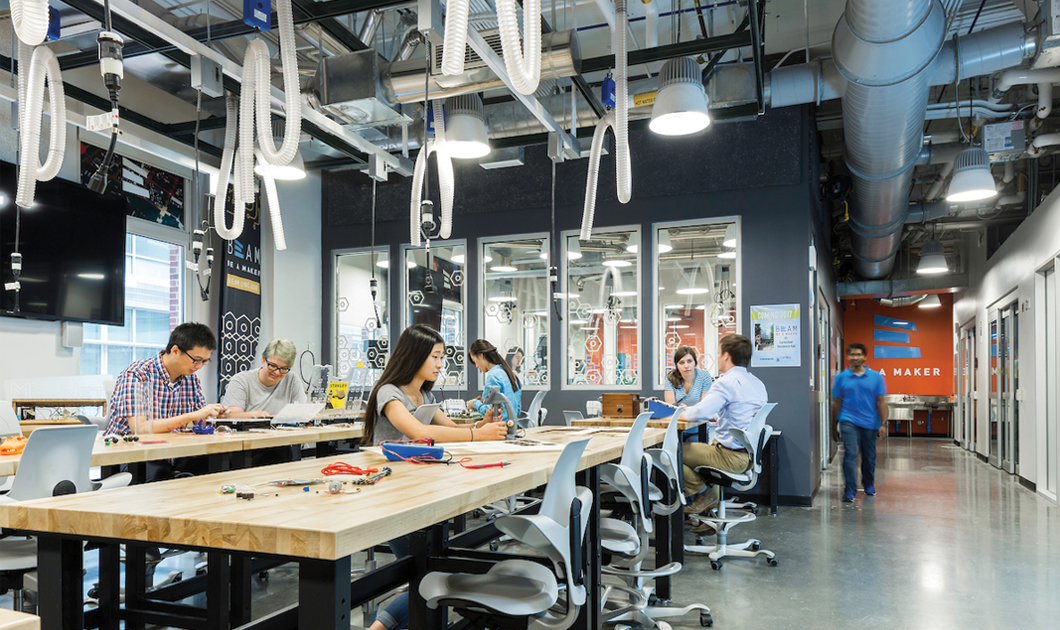By Efthymios Altsitsiadis
Anyone can and should have access to the tools and knowledge necessary to build anything they might need or want. This statement struck me when I first read about the makers movement – a cultural trend that is associated with democratized manufacturing, 3D printing and maker spaces.
At the heart of the movement lies a simple premise – ordinary people manufacturing themselves what they need. Makers, alone or in communities, from any career or skill level are pulled into making something, from calligraphy to furniture to technology and lately to personal protective equipment.
Large institutions like the European Commission, the White house and the Chinese government herald the maker movement as a major driver for the new “industrial revolution”, a thriving multibillion market and a potential asset in the fight against climate change.
But as with every nascent field, there are many hurdles on our way there – this piece will touch upon what many (including me) consider the most important: understanding how and why people embrace the movement.
We already know that the increase of availability and affordability of digital fabrication tools such as 3D printers and laser cutters and the advance in certain collaborative technologies have favored the creation of a rapidly increasing number of Do-It-Yourself communities. What we know much less about is why people choose to become makers. This matters gravely, not only because makers are the lifeline of the movement – but because we need to be sure that everyone can enjoy the same access to fabrication. In a large study supported by the EU, we asked thousands of citizens around Europe their opinions regarding the maker movement [1].
We wanted to understand better what people know about the maker movement, how aware they are about fabrication and how they perceive the different facilities (e.g. makerspaces). We also investigated various attitudes and potential reasons that could be driving or hampering people’s support to the movement. More importantly, however, we asked participants about their intentions to become makers and what motivates them.
Findings of our study
What we found confirmed many of our initial thoughts.
Most of the participants were not well aware about the maker movement (40% had no familiarity with the term), but about 1 in 5 respondents had some previous experience with making. These people come from all walks of life, and despite some small differences in demographics, every cohort is represented.
A very positive finding was that most people were very open to visiting, supporting or participating in making activities in their local area. For the majority of respondents, their participation in maker spaces would provide them with benefits and help them improve their skills. The majority also believes that makerspaces will have a positive impact on their region and will open-up new professional opportunities. We dug a bit deeper so we can get a better understanding of people’s motivations.
We found that respondents who have positive perceptions about sustainability and circular economy, who were familiar with the maker movement and who defined themselves as persons who like to repair or make things were significantly more likely to join the movement.
The results also indicate that demographics like gender and age could be playing a role in driving respondent’s perceptions and participation.
This study is useful in providing some additional evidence and answers regarding the engagement of Europeans with the Maker Movement to the existing body of knowledge. But it is obviously not enough. There are literally dozens of overlooked dimensions and potential levers for getting people involved or at least for actively supporting the movement. Essential issues like awareness, knowledge and skills, safety and accessibility, tools and incentives are all open for inquiry and experimentation. The movement itself is still shaping and many of the key characteristics should not be taken for granted; least of all its openness to everyone and its sustainability/circularity character.
The good news is that there are already major initiatives being deployed at various levels that are working on many of these angles (for interested readers I would like to refer you to projects like Pop-Machina, iProduce, Reflow, all sponsored by the EC and open to interested members of the public). In all these initiatives, cross-collaboration is key. Academics should work hand in hand with practitioners, industry and policy makers to embrace and support this amazing revolution and help nudge it towards its greatest ambitions – democratized access to circular production.
References
[1] Panori, A., Piccoli, A., Ozdek, E., Spyridopoulos, K. and Altsitsiadis, A. (2020). Market research report. (Deliverable 2.2). Leuven: Pop-Machina project 821479 – H2020
About the Author
Assistant Prof. Efthymios Altsitsiadis, PhD is a behavioural economist with a mind for interdisciplinary research. A user-centricity enthusiast, Efthymios is set to help provide evidence-based answers to some of the most persistent and evasive behavioural questions in a variety of areas like sustainability, health, energy and mobility. He is currently teaching Machine Learning and Digital Behaviour at CBS. He conducts research in collaborative production and circular economy, in advanced technological agents (smart apps, avatars, chat-bot services) and has worked as a social scientist in several cross-disciplinary research projects.

